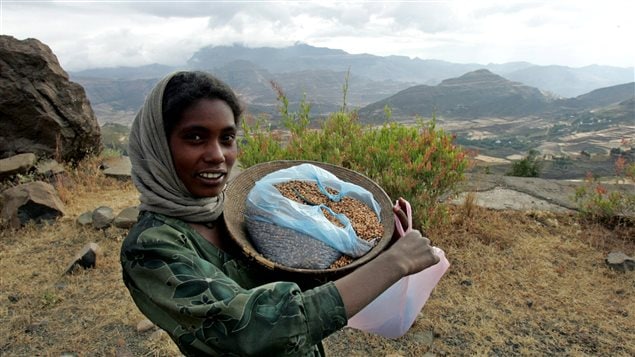Canada is contributing $30 million to several United Nations agencies and non-governmental organizations working to provide emergency humanitarian assistance to millions of people in drought-stricken in Ethiopia, federal minister of international development and La Francophonie announced Thursday.
Marie-Claude Bibeau made the announcement in Tokyo as she met with Tedros Adhanom Ghebreyesus, Ethiopia’s Minister of Foreign Affairs.
The crisis, which is expected to affect up to 20 million people in Ethiopia, is the result of drought caused by a particularly strong El Niño event warming the Pacific Ocean and affecting global weather patterns, according to background documents released by Global Affairs Canada.
Canada’s funding for Ethiopia will help meet critical food, health and nutrition, and water and sanitation needs in response to the deteriorating situation throughout the country, the document said.
“Ethiopia can count on Canada’s continued engagement and support. We are concerned by the food security situation in Ethiopia and will continue to monitor it and act quickly to protect the poorest and most vulnerable,” Bibeau said in a statement.
Welcome news
Kevin Dunbar, director of Humanitarian Assistance and Emergency Team at Care Canada, whose agency will receive almost $2 million to support its work in Ethiopia said he welcomes the news.
“Ethiopia is one of the worst-hit countries and at the moment there is extreme drought, which means families on the ground don’t have enough food, and don’t have access to enough clean water,” Dunbar said speaking on the phone from Ottawa. “It’s a critical moment for the Ethiopian government and international community to step up and help people.”
The largest effect of the El Niño in Ethiopia will be felt in January and February, Dunbar said.
The money Care will receive from the federal government will be spent on meeting the immediate humanitarian needs of drought-affected families in the West Hararghe zone of Oromiya state, he said.
“The work that we’re doing in Ethiopia is in two areas: in nutrition and water and sanitation,” Dunbar said. “We’re working with the government to make sure they have the tools and the capacity to treat severe and moderate malnutrition cases in children, pregnant and lactating women.”
Access to clean drinking water is another big problem, Dunbar said.
“One of the biggest issues for recurring malnutrition, and the reason that people are not able to recover from malnutrition, is often access to safe drinking water,” he said. “So alongside with our work on nutrition Care is going to ensure there is access to safe drinking water.”
Care Canada is also greatly concerned by the disproportionate burden this crisis is placing on women and girls, who are largely responsible for ensuring families have food and water, Dunbar said.
“They are spending a lot more time every day walking to get drinking water or collecting and selling firewood to have some money for food,” Dunbar said.
Where is the money going?
Canada’s contribution will be allocated as follows:
- United Nations World Food Programme (WFP): $21.5 millionto help provide emergency food assistance to at least 6 million people in Ethiopia through food distribution, cash or vouchers, or food-for-work activities.
- United Nations Children’s Fund (UNICEF): $2.5 millionto support national and international efforts combatting acute malnutrition through the management of a common pipeline for high-nutrient therapeutic food products and medicines, providing improved access to safe water and proper sanitation for drought-affected households and providing protection for children who face increased vulnerability due to the drought.
- CARE Canada: $1.9 million to help meet the humanitarian needs of drought-affected households in the West Hararghe zone of Oromiya state through improved access to treatment for acute malnutrition, provision of safe water and adequate sanitation facilities, and education on hygiene practices.
- Concern Worldwide: $1.6 millionto help meet the humanitarian needs of more than 29,000 drought-affected people in the South Wollo zone of Amhara state through improved access to treatment for acute malnutrition.
- World Vision Canada: $1.25 million to help meet the humanitarian needs of drought-affected households in the state of Tigray’s Southern zone and in Oromiya’s Borena zone through improved access to treatment for acute malnutrition and the provision of safe water, adequate sanitation facilities, and education on hygiene practices.
- Doctors Without Borders Canada: $1.25 millionto provide access to a wide range of primary and secondary health care services, including screening and treatment for acute malnutrition, for people living in the Jarar and Nogob zones of Ethiopia’s Somali regional state.
The above funding is in addition to two grants, totalling $5 million, to the WFP ($3.5 million) and UNICEF ($1.5 million) that Canada provided in October 2015 in response to the drought, said the document by Global Affairs Canada.
Although Ethiopia is one of the worst-hit countries, the effects of El Niño are being felt across southern and eastern Africa, the Asia-Pacific region and Central America.







For reasons beyond our control, and for an undetermined period of time, our comment section is now closed. However, our social networks remain open to your contributions.